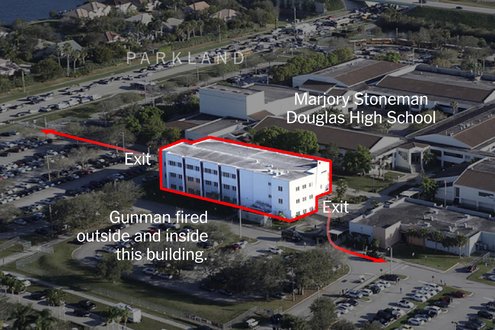
“So many signs that the Florida shooter was mentally disturbed, even expelled from school for bad and erratic behavior,” Mr. Trump said in a tweet hours before he addressed the public. “Neighbors and classmates knew he was a big problem. Must always report such instances to authorities, again and again!”
He delivered similar remarks in November, after a gunman with a military-style rifle mowed down more than two dozen parishioners in a church in Sutherland Springs, Tex. Mr. Trump told reporters that the problem “isn’t a guns situation” and that the shooting signified “a mental health problem at the highest level.”
In October, after a gunman in Las Vegas killed 58 people and wounded hundreds in the deadliest mass shooting in United States history, Mr. Trump called the assailant “a very sick man” and a “demented person.”
Graphic
What Happened Inside the Florida School Shooting
A gunman armed with a semiautomatic AR-15 assault rifle and “countless magazines” killed at least 17 people at his former high school on Wednesday.

Other members of his party echoed Mr. Trump’s sentiments. In a brief news conference, Speaker Paul D. Ryan said that “there may be some mental health issues with this shooting,” adding that it was not the time to jump to conclusions about tightening gun laws. In an address to a conference in Washington, Attorney General Jeff Sessions said law enforcement officers should look for warning signs in their communities.
“You and I know we cannot arrest everybody that somebody thinks is dangerous,” Mr. Sessions said. “But I think we can and we must do better. We owe it to every one of those kids crying outside their school yesterday and all those who never made it out of that school.”
As a presidential candidate, Mr. Trump enjoyed a mutually beneficial relationship with the National Rifle Association. The organization provided at least $30 million in support during his campaign. Receiving a hero’s welcome at the group’s annual convention last April, Mr. Trump said he would return the favor.
“Only one candidate in the general election came to speak to you, and that candidate is now the president of the United States, standing before you,” Mr. Trump said at the time. “You came through for me, and I am going to come through for you.”
But as with many issues, the president has had a complicated relationship with — and history of comments about — gun control.
Mr. Trump had a concealed weapon permit in New York when Rudolph W. Giuliani was mayor. It is not clear whether he maintained it. He also has spoken favorably about gun rights over the years. However, he has made clear that he is not a game hunter, like his two older sons.
In 2000, as he considered running for president, he wrote in his book, “The America We Deserve,” that “I generally oppose gun control, but I support the ban on assault weapons and I also support a slightly longer waiting period to purchase a gun.”
He added, “With today’s internet technology we should be able to tell within 72 hours if a potential gun owner has a record.”
Mr. Trump’s decision to remain focused on mental illness as president incensed several Democratic lawmakers, including Representative Joseph Crowley of New York.
“The onus is not on children to #EndGunViolence,” Mr. Crowley wrote on Twitter. “When will you lead, Mr. President?”
In an appearance on CNN, another Democrat, Senator Richard Blumenthal of Connecticut, disputed Mr. Trump’s focus on mental health, and pointed out the high rates of gun violence in the United States compared with other countries. Mr. Blumenthal said that after the Sandy Hook shooting, Connecticut worked to reduce gun violence by passing measures to ban assault weapons and increase background checks.
But “we are at the mercy of the weakest states,” Mr. Blumenthal said, “even when we have the strongest gun laws.”
Senator Bill Nelson, Democrat of Florida, said in an appearance on CNN that “we’ve been through this a lot, and each time we say enough is enough and then of course it isn’t enough.”
Mr. Trump called for the American flag to fly at half-staff at the White House and other public buildings and grounds as a sign of respect for the shooting victims. About halfway through his short address, the president said he wanted to speak directly to America’s children.
“I want you to know that you are never alone and you never will be. You have people who care about you, who love you and who will do anything at all to protect you,” Mr. Trump said. “If you need help, turn to a teacher, a family member, a local police officer or a faith leader. Answer hate with love, answer cruelty with kindness.”
Mr. Trump said he would meet later this month with a group of state governors and attorneys general to make school safety a “top priority.”
Sarah Huckabee Sanders, the White House press secretary, said details were still being finalized for his visit to Parkland, but on Friday, he is scheduled to travel to Mar-a-Lago, his Florida estate, which sits about 40 miles north of there. Mr. Trump originally was scheduled to visit the Orlando area on his way, but White House officials said shortly after his speech that the Orlando stop had been canceled.
Continue reading the main story
Powered by WPeMatico

